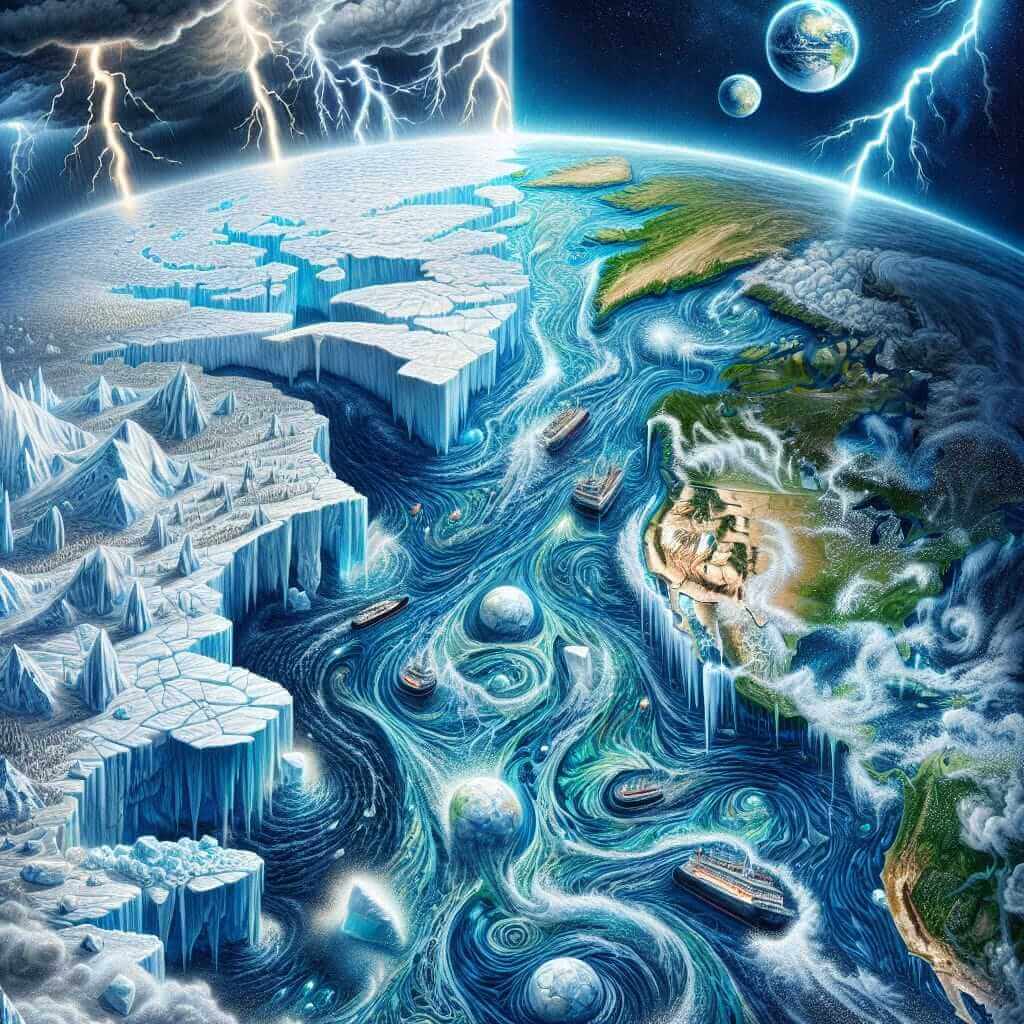The IELTS Reading section tests your ability to comprehend complex texts, identify key points, and understand detailed information. One recurring theme in past exams has been climate change, a topic of significant relevance and complexity. Understanding “How does climate change affect global weather systems?” could potentially prepare you for future Reading exams.
This topic not only appears frequently due to its importance but also encompasses several subtopics that may be tested. These include the effects on agriculture, oceanic ecosystems, and energy systems. As climate change remains a hot topic globally, it is probable that such themes will appear in future IELTS exams.
In this article, we will explore this subject in detail through a sample IELTS Reading text, corresponding questions, and thorough explanations.
Sample IELTS Reading Text
The Effects of Climate Change on Global Weather Systems
Climate change, driven primarily by human activities such as burning fossil fuels and deforestation, is significantly altering global weather systems. Understanding these changes is crucial not only for scientific communities but also for policymakers worldwide.
One of the most noticeable impacts of climate change is the increase in average global temperatures. This phenomenon, known as global warming, affects weather patterns by intensifying the water cycle. Higher temperatures increase the rate of evaporation, which can lead to more severe and frequent storms, hurricanes, and typhoons. These events are particularly destructive in coastal and low-lying areas, leading to increased flooding and erosion.
Furthermore, rising temperatures are causing polar ice caps and glaciers to melt at an unprecedented rate. The decline in ice mass contributes to sea-level rise, which threatens millions of people living in coastal regions. The melting of ice also disrupts ocean currents, which play a critical role in regulating the Earth’s climate. For example, the Gulf Stream, a warm Atlantic ocean current, has slowed, impacting weather patterns in North America and Europe.
Additionally, climate change affects weather extremes. Regions that were once temperate are experiencing more intense heatwaves, while others face extended periods of drought or unusually heavy rainfall. These extreme weather conditions make it difficult for ecosystems to adapt, leading to biodiversity loss. Agricultural productivity also suffers as crops fail to withstand the new climate norms, affecting food security globally.
In conclusion, the impacts of climate change on global weather systems are profound and manifold. From altering rainfall patterns to intensifying natural disasters, the evidence of climate change is unmistakable. Immediate action is required to mitigate these adverse effects to safeguard our planet for future generations.

Questions
Multiple Choice
-
According to the text, what is one of the primary drivers of climate change?
- A. The water cycle
- B. Melting ice caps
- C. Human activities
- D. Ocean currents
-
What effect does increased evaporation due to higher temperatures have on weather?
- A. Causes more severe and frequent storms
- B. Lowers sea levels
- C. Slows down the Gulf Stream
- D. None of the above
True/False/Not Given
-
The melting of polar ice caps contributes to the rise in sea levels.
- True
- False
- Not Given
-
Heatwaves are becoming less intense in regions that were once temperate.
- True
- False
- Not Given
Summary Completion
Complete the summary using words from the box below.
global warming, policymakers, biodiversity, rainfall, evaporation
Climate change affects weather patterns in several ways. One of the most noticeable impacts is an increase in average global temperatures, known as (5) ____. This intensifies the water cycle, leading to increased (6) ____, which contributes to more severe storms. Additionally, climate change affects weather extremes, causing biodiversity loss as ecosystems struggle to adapt.
Answer Keys
-
C. Human activities
- Explanation: The text states, “Climate change, driven primarily by human activities such as burning fossil fuels and deforestation.”
-
A. Causes more severe and frequent storms
- Explanation: The text mentions that higher temperatures increase the rate of evaporation, leading to more severe and frequent storms.
-
True
- Explanation: The text clearly states, “Furthermore, rising temperatures are causing polar ice caps and glaciers to melt at an unprecedented rate. The decline in ice mass contributes to sea-level rise.”
-
False
- Explanation: The text indicates, “Regions that were once temperate are experiencing more intense heatwaves.”
-
global warming
- Explanation: The summary refers to the phenomenon of rising average global temperatures.
-
evaporation
- Explanation: The increased rate of evaporation leads to more severe weather patterns.
Common Mistakes
- Misinterpreting keywords: Ensure you understand the central idea and do not get confused by complex terms.
- Overlooking small details: Pay close attention to details that could influence your answers, such as specific numbers or names.
- Time management: Allocate sufficient time to read the passage, understand the questions, and review your answers.
Vocabulary List
- Intensify (v) – /ɪnˈtɛnsɪˌfaɪ/: to become stronger or more extreme.
- Evaporation (n) – /ɪˌvæpəˈreɪʃən/: the process of a liquid turning into gas.
- Unprecedented (adj) – /ʌnˈprɛsɪˌdɛntɪd/: never done or known before.
- Biodiversity (n) – /ˌbaɪoʊdaɪˈvɜrsɪti/: the variety of life in the world or in a particular habitat or ecosystem.
Grammar Focus
Using the Passive Voice
When discussing scientific phenomena, the passive voice is often used to emphasize the action rather than the subject performing the action.
- Example: “Higher temperatures increase the rate of evaporation” can also be written as “The rate of evaporation is increased by higher temperatures.”
Tips for Scoring High in IELTS Reading
- Skim and scan: Quickly get the gist of the text before diving into the questions.
- Highlight keywords: This will help you locate information rapidly within the text.
- Practice regularly: Regular practice of various types of reading passages will improve your comprehension skills and speed.
Mastering topics like climate change and its effects on global weather systems will not only enhance your IELTS Reading skills but also keep you well-informed about current global issues. Keep practicing and good luck!